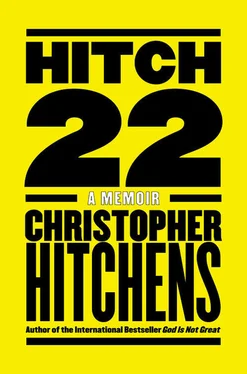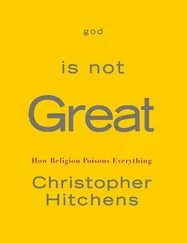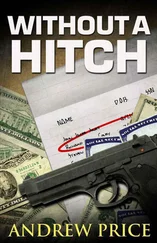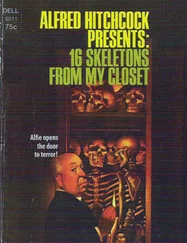Melissa in any case was as brisk and tender as I would have wanted to be if our situations had been reversed. Had I listened to that morning’s BBC news? No. Well, there was a short report about a woman with my surname having been found murdered in Athens. I felt everything in me somehow flying out between my toes. What? Perhaps no need to panic, said Melissa sweetly. Had I seen that morning’s London Times ? No. Well, there was another brief print report about the same event. But listen, would there have been a man involved? Would this woman called Hitchens (not that common a name, I dully thought) have been traveling with anybody? Yes, I said, and gave the probable or presumable name. “Oh dear, then I’m very sorry but it probably is your mum.”
So the rather diffident and wispy ex-Reverend Bryan, so recently my guest at dinner, had bloodily murdered my mother and then taken his own life. Beneath that scanty exterior had lain a raving psycho. That was what all the reports agreed in saying. In some hotel in Athens, the couple had been found dead separately but together, in adjoining rooms. For my father, who was the next person to ring me, this was especially and particularly devastating. He was not far short of his sixty-fifth birthday. He had also had to reconcile himself to the loss of his adored wife’s affection, in a day when divorce was still considered scandalous, and had reluctantly agreed that she would spend much of her private time at the house of another man. But at the respectable boys’ prep school where he kept the books, and in the surrounding society of North Oxford, the two of them had had a pact. If invited to a sherry party or a dinner, they would still show up together as if nothing had happened. Now, and on the front pages at that, everything was made known at once, and to everybody. I do not know how he bore the shock, but there was no question of his coming to Athens, and I myself, in any case, was already on my way there and honestly preferred to face it alone.
This lacerating, howling moment in my life was not the first time that the private and the political had intersected, but it was by some distance the most vivid. For many people in my generation, the seizure of power in Greece by militaristic fascists in April 1967 had been one of the definitive moments in what we were retrospectively to call “the Sixties.” That a Western European country—the stock phrase “cradle of democracy” was seldom omitted—could have been hijacked by a dictatorship of dark glasses and torturers and steel helmets and yet remain within NATO: the whole idea made a vulgar satire of the Cold War propaganda about any “free world.” I had spoken at the Oxford Union alongside Helen Vlachos, the heroic publisher of the Athens daily paper Kathimerini , which had closed and padlocked its doors rather than submit to censorship. I had taken part in protests outside the Greek embassy, and passed out numberless leaflets echoing Byron’s line “that Greece might yet be free.” And then, almost as my mother lay dying, the Athens junta had in fact been overthrown—but only from the extreme right, so that its replacement was even more vicious than its predecessor. Thus it was that when I first saw the city of Pericles and Phidias and Sophocles, its main square was congested with dirty-gray American-supplied tanks, and its wine-dark sea at Phaleron Bay and Sounion full of the sleek shapes of the U.S. Sixth Fleet.
The atmosphere of that week at the end of November 1973 is instantly accessible to me, and in an almost minute-by-minute way. I can remember seeing the students yelling defiance from behind the wrecked gates of the rebellious Athens Polytechnic, after the broad-daylight and undisguised massacre of the unarmed anti-junta protestors. I can remember meeting friends with bullet wounds that they dared not take to the hospital. I recall, too, a party in a poor student’s crummy upstairs apartment, where those present made the odd gesture of singing “The Internationale” almost under their breath, lest they attract the attention of the ever-prowling secret police. My old notebook still contains the testimony of torture victims, with their phone numbers written backward in my clumsy attempt to protect them if my notes were seized. It was one of my first forays into the world of the death squad and the underground and the republics of fear.
With Yvonne lying cold? You are quite right to ask. But it turns out, as I have found in other ways and in other places, that the separation between personal and public is not so neat. On arrival in Athens, I had of course gone directly to meet the coroner in my mother’s case. His name was Dimitrios Kapsaskis. It rang a distinct bell. This was the man who had, without wishing to do so, taken a starring part in that greatest of all Sixties movies, Z . In this filmic-political masterpiece by Constantine Costa-Gavras, Kapsaskis testified that the hero Gregory Lambrakis had broken his skull accidentally in a fall, rather than having had it smashed by a secret-police operative. Sitting opposite this shabby official villain and trying to talk objectively about my mother while knowing what was happening to my friends outside on the street was an education of a kind.
It was the same when I had to go to the local police station for other formalities. Captain Nicholas Balaskas faced me across a desk in a forbidding office on Lekkas Street which displayed the blazing phoenix: the compulsory logo and insignia of the dictatorship. At the British embassy, which was then run by a genial old diplomat whose son had been with me at Balliol, I had to sit through a lunch where a reactionary creep of a Labour MP named Francis Noel-Baker gave a lecture about the virtues of the junta and (the first but not the last time I was ever to hear these two arguments in combination) both denied that it tortured its prisoners while asserting that it would be quite justified if it did do so!
I then had a strange moment of shared mourning, which helped remind me of what I obviously already “knew”: namely that my own bereavement was nothing unique. In a run-down restaurant near Syntagma Square I endured a melancholy lunch with Chester Kallman. This once-golden boy, who W.H. Auden had feared might be “the wrong blond” when they first met in 1939, had since been the life-partner and verse-collaborator of the great poet, the source of much of his misery as well as much of his bliss, and the dedicatee of some especially fervent and consecrated poems. He was fifty-two and looked seventy, with an almost grannyish trembling and protruding lower lip and a quivering hand that spilled his avgolemono soup down his already well-encrusted shirtfront. Difficult to picture him as the boy who had once so insouciantly compared himself to Carole Lombard. I had only a few weeks previously gone to Christ Church Cathedral in Oxford to attend Auden’s memorial. My dear friend James Fenton, who had been a protégé of Auden’s and a sometime guest at the Auden-Kallman home in Kirchstetten, had just won the Eric Gregory Award for poetry and decided to invest the prize money in an intrepid voyage to Vietnam that was to yield its own poetic harvest, so I had gone back to Oxford in part to represent him in his absence, as well as to witness a gathering of poets and writers and literary figures, from Stephen Spender to Charles Monteith (discoverer of Lord of the Flies ), who were unlikely ever to gather in one place again. Kallman, who had about two years left to live, was not especially desirous of hearing about any of this. “I do not wish,” he said slurringly, “to be thought of as Wystan’s relict .” Uncharitably perhaps, and even though I knew he had done some original work of his own, I wondered if he seriously expected to be much or long remembered in any other way.
Читать дальше











